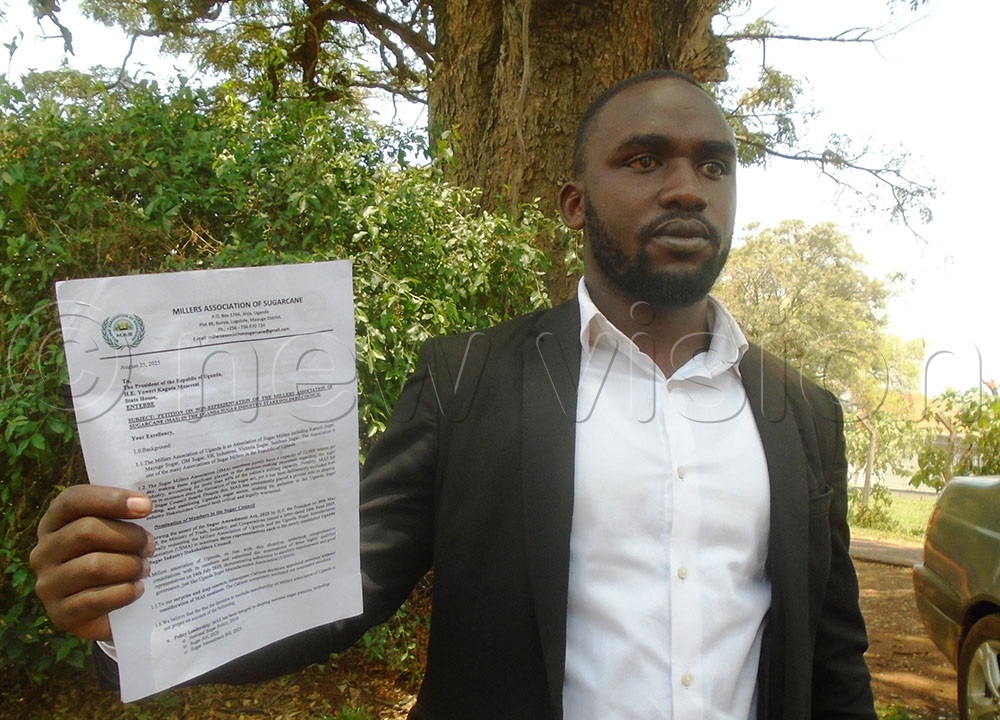Millers petition Museveni over industry representation
“Members of MAS jointly have a milling capacity of 22,000 tonnes per day, making them significant players in the decision-making processes regarding the sugar industry. This accounts for more than 40% of the nation’s milling capacity,” Dobaria says.
“The sugar council is in the process of being set up; the concerned authorities are currently scrutinising the names submitted. There is no cause for worry.” (Credit: Charles Kakamwa)
JINJA - The Millers Association of Sugarcane (MAS), an umbrella body of six sugar mills, has petitioned President Yoweri Museveni over non-representation on the Uganda Sugar Industry Stakeholders Council.
The association comprises Kamuli Sugar, Mayuge Sugar, GM Sugar, HK Industries, Victoria Sugar, and Sezibwa Sugar.
In an August 25, 2025, letter to the President, MAS chairperson Milan Dobaria says their exclusion from the council, which is meant to regulate the sugar industry, is unfair considering their contribution to the sector.
“Members of MAS jointly have a milling capacity of 22,000 tonnes per day, making them significant players in the decision-making processes regarding the sugar industry. This accounts for more than 40% of the nation’s milling capacity,” he says.
“Notably, MAS has been in existence since the formation of the Sugar Act, yet it has been deliberately excluded from the Sugar Council Board. Despite this, MAS has consistently played a pivotal role in shaping, funding, and stabilising Uganda’s sugar sector, making its inclusion in Uganda Sugar Industry Stakeholders Council both critical and legally warranted,” he writes.
Dobaria explains that after assent to the Sugar Amendment Act, 2025, on May 30, 2025, by the president, the Ministry of Trade, Industry and Cooperatives, in a letter dated June 16, 2025, requested MAS and Uganda Sugar Manufacturers Association (USMA) to nominate three representatives each to the newly established council.
He says in line with the directive, MAS submitted three highly qualified representatives on July 14, 2025, demonstrating adherence to statutory requirements and good governance, as was the case with USMA.
“To our surprise and deep concern, subsequent Cabinet decisions appointed members without consideration of MAS nominees. The Cabinet completely excluded our nominated members,” he writes.
According to Dobaria, USMA, which brings together the traditional sugar companies: Kakira Sugar Limited, Sugar Corporation of Uganda Limited (SCOUL), and Kinyara Sugar Limited, is fully represented, unlike MAS.
He says the decision to exclude MAS from the council was improper, considering that it played an integral role in shaping national sugar policies, including the National Sugar Policy 2010, Sugar Act 2020, and the Sugar amendment Bill 2025.
“MAS has co-founded and led numerous farmer-miller dialogues and initiatives throughout the process of coming up with a regulatory body (the sugar council), facilitated equitable pricing, contract farming, and rural empowerment.”
“It has contributed substantially to the operationalization of the Uganda Sugar Industry Stakeholders Council, demonstrating commitment to sector governance and sustainability,” he said.
According to Dobaria, USMA, which brings together the traditional sugar companies: Kakira Sugar Limited, Sugar Corporation of Uganda Limited (SCOUL), and Kinyara Sugar Limited, is fully represented, unlike MAS. (Credit: Charles Kakamwa)
A threat to integrity
According to Dobaria, the exclusion of MAS, threatens the integrity, inclusivity, and effectiveness of the Uganda Sugar Industry Stakeholders Council, undermining Section 3(6) and (7) of the Sugar Amendment Act 2025, which provides for representation of millers from key sugarcane catchment and growing areas.
“This decision risks marginalizing significant portion of millers, destabilising ongoing sector initiatives and eroding confidence among investors, farmers and stakeholders,” he says.
Dobaria calls on Cabinet to urgently review the current appointments to the Uganda Sugar Industry Stakeholders Council and include MAS’ nominees to ensure a fair and balanced representation of all millers.
The letter was copied to, among others, the Vice-President, trade minister, Minister for the Presidency, Speaker of Parliament, gender minister, trade ministry permanent secretary and USMA.
George Bamwine, the MAS communications officer, said once the council is fully constituted and operationalised, it will save the industry from several challenges it is grappling with.
Remain calm
Hadijah Nakakande, the public relations officer of the trade ministry, in an interview with New Vision Online, however, asked all parties to remain calm as formation of the council is still underway.
She noted that when the process is completed, an official announcement shall be made to inform stakeholders of its composition.
“The sugar council is in the process of being set up; the concerned authorities are currently scrutinising the names submitted. There is no cause for worry.”
“The amendment in the law was purposely made to ensure that all stakeholders are represented and have a say in the decision-making,” she said on Friday, September 5, 2025.
According to Julius Katerevu, chairman of Mukono outgrowers cooperative society limited and a nominee to the council, it is meant to comprise of 10 people.
These, he said, include 4 representatives of the farmers sent from the different regions, 3 representatives of the millers, and 3 from government ministries (trade, agriculture, and finance).